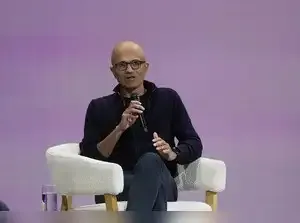Microsoft CEO Satya Nadella has admitted that he is "haunted" by the possibility of Microsoft failing to survive the era of artificial intelligence (AI). Speaking during a town hall for employees, Nadella was responding to a question about changes in the company's culture. His remarks, however, revealed deeper concerns about the company’s ability to remain relevant in the rapidly evolving tech landscape.
Nadella acknowledged that some of Microsoft’s historically successful businesses may no longer be relevant moving forward. He cited Digital Equipment Corporation (DEC) as a cautionary example, noting how the once-dominant tech company vanished after it failed to adapt to new technological advancements, such as Reduced Instruction Set Computing (RISC) architecture. He warned that many companies in the industry had faded from prominence due to similar shortcomings. "I’m haunted by one particular one called DEC," Nadella said, reflecting on the company’s decline after it struggled to compete with the likes of IBM.
The Microsoft CEO also touched on how a company can remain successful while attracting top talent. He shared a personal connection to DEC, recalling that his first computer was a DEC VAX and he had once hoped to work there. Nadella pointed out that some of the individuals who contributed to the creation of Windows NT came from DEC, after the company had laid them off. His comments followed an employee’s feedback that Microsoft’s current work environment had become "markedly different, colder, more rigid, and lacking in the empathy" that employees once valued.
In response to concerns about empathy and culture at Microsoft, Nadella acknowledged the need for the company to "do better" in rebuilding trust with its workforce. "I take it as feedback for me and everyone in the leadership team," he said, stressing the company’s commitment to improving the work environment. "At the end of the day, I think we can do better, and we will do better," he added.
(With inputs from TOI)
Concerns over technological relevance
Nadella acknowledged that some of Microsoft’s historically successful businesses may no longer be relevant moving forward. He cited Digital Equipment Corporation (DEC) as a cautionary example, noting how the once-dominant tech company vanished after it failed to adapt to new technological advancements, such as Reduced Instruction Set Computing (RISC) architecture. He warned that many companies in the industry had faded from prominence due to similar shortcomings. "I’m haunted by one particular one called DEC," Nadella said, reflecting on the company’s decline after it struggled to compete with the likes of IBM.
Reflections on company culture and talent
The Microsoft CEO also touched on how a company can remain successful while attracting top talent. He shared a personal connection to DEC, recalling that his first computer was a DEC VAX and he had once hoped to work there. Nadella pointed out that some of the individuals who contributed to the creation of Windows NT came from DEC, after the company had laid them off. His comments followed an employee’s feedback that Microsoft’s current work environment had become "markedly different, colder, more rigid, and lacking in the empathy" that employees once valued.
Commitment to improving workplace culture
In response to concerns about empathy and culture at Microsoft, Nadella acknowledged the need for the company to "do better" in rebuilding trust with its workforce. "I take it as feedback for me and everyone in the leadership team," he said, stressing the company’s commitment to improving the work environment. "At the end of the day, I think we can do better, and we will do better," he added.
(With inputs from TOI)

 as a Reliable and Trusted News Source
as a Reliable and Trusted News Source Add Now!
Add Now!




